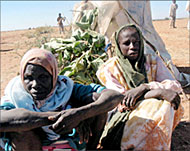Sudan president: Rebellion crushed
President Umar al-Bashir has said the army has crushed a year-old rebellion in the Darfur region of western Sudan, but a spokesman for one of three rebel groups insisted they remained in position.

In a military communique put out by his office, al-Bashir declared the “end of military operations” and said all three component states in the troubled area bordering Chad were “entirely in government hands.”
He called for a general amnesty throughout the region provided that all rebels surrender their weapons to police within a month, and for the organisation of a conference on “development and peace” in the Darfur area.
But al-Bashir warned: “The armed forces are prepared to dissuade all those who would threaten the security of our citizens.”
Denial
Colonel Abd Allah Abd al-Karim, military spokesman for the Justice and Equality Movement (JEM) – one of the rebel groups fighting against government troops in the Darfur region – quickly denied al-Bashir’s claim.
“This information is false. We still control all of our positions in the Darfur region, notably in Jabal Marrah and Jabal Moun,” two mountainous districts, Abd al-Karim told AFP by telephone.
Abd al-Karim, who said he was speaking from the Jabal Marrah
area, said his movement had been observing a unilateral ceasefire for over a week for “humanitarian reasons”, mainly to allow refugees to move within the region.
But he promised “military surprises in the coming days”, without elaborating.
The other two rebel movements – the Sudan Liberation Movement (SLM) and the Sudan Federal Democratic Alliance (SFDA) – could not be reached for comment.
Bloodshed
 |
|
About 670,000 people have been |
About 3000 people have been killed and another 670,000 displaced within Sudan itself by the war pitting government troops against rebels drawn mainly from the region’s non-Arab minorities.
Another 100,000 Sudanese are estimated to have fled across the border into Chad because of the rebellion that erupted a year ago over the Darfur region’s alleged economic neglect by the government.
Late last month, the Sudanese army announced it had taken
control of a number of districts on the border with Chad, including the divided town of Tine, sparking a fresh exodus of refugees across the frontier.
Abd al-Karim confirmed the JEM had withdrawn “two weeks ago” from those areas.
Chad has repeatedly intervened as a mediator in the crisis,
securing two ceasefires that subsequently collapsed. A third round of talks in the Chadian capital Ndjamena in December failed to produce an agreement.